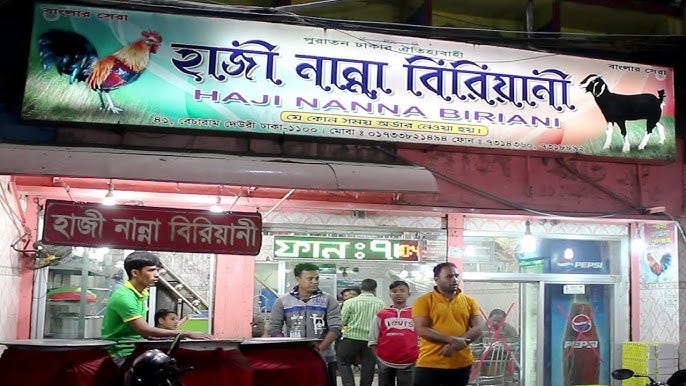It's time for the second part where we'll discuss the superstars of Dhaka's biryani and pulao houses. I have written about this before, and I am writing about it today as well. Generally, biryani can be classified in various ways based on cooking technique. When meat and rice are cooked separately and then mixed, it is called "pakki biryani." When meat and rice are cooked together, it is prepared in the "pulao" style. In today's segment, we will discuss the traditional biryanis of old Dhaka.
In old Dhaka, the top choice for biryani lovers is "Hazi Biryani." In 1939, Hazi Mohammad Hossen established "Hazi Biryani." He started this business with a single pot of biryani. Later, due to the excellent taste and quality of his biryani, the name "Hazi Biryani" became famous. Today, his descendants continue to run the business. They serve Hazi Biryani in a traditional style, with a jackfruit leaf plate. Instead of using ghee or butter in the biryani, they use mustard oil. They still use all the traditional spices, making Hazi Biryani a favorite for everyone due to its taste and aroma. The shop at Nazira Bazaar, Kazi Alauddin Road, is open from 11 AM to 12 AM.
In 1950, Abdul Kader Mia started Makhon Biryani. Due to the combination of taste and quantity, Makhon Biryani became a top choice for customers. Abdul Kader's son, Hazi Makhon, continued the business after his father. Today, his descendants run the business. The main attraction of Hazi Makhon Biryani is the "nolli" biryani. The shop at Raisaheb Bazaar, Nasir Uddin Sardar Lane, is open from 9 AM to 4 PM.
In the Moulvibazar area of Old Dhaka, Baburchi Nanna Mia started the Baburchi Nanna Mia Biryani shop in the 1960s. Gradually, Hazi Nanna Biryani became popular among food enthusiasts. Here, you can find biryani alongside chicken pulao, chicken rezala, firni, tikia, and borhani. The tradition of the family continues to this day. The shop at Becharam Deuri's number 41 is open from 11 AM to 11 PM, and Murg Pulao (another iconic pulao) is sold here on the 5th of every month.
Starting in the 1960s, Shah Sahib's Biryani began its journey. To taste Shah Sahib's Biryani, you have to visit Chak Bazar every morning since this biryani is only available in the morning. By 9 AM, the biryani is already finished. In addition to biryani, every Monday and Wednesday, they serve chicken pulao here. These biryanis are known for their minimal use of spices. You can find Shah Sahib's Biryani by taking a straight path through the lane of Banik Samiti opposite Shahi Jame Masjid in Chak Bazar.
When the entire capital city is deep in quiet slumber, there is bustling activity in Dighubabu Lane during the afternoon. As soon as you step into the lane, you'll see people's commotion. Everyone has come to eat pulao! Yes, you read it right, pulao in the middle of the night! This is the famous Manik Chan's pulao. In old Dhaka, "Manik Chan" is a well-known name. To enjoy Manik Chan's pulao, you have to go there in the middle of the night. Sales end before the sun rises. There are no proper shops or other conveniences. Nevertheless, the demand for this food is sky-high, and it's such that if you want to eat Manik Chan's pulao, you have to go there at 3 in the night. They start giving tokens from this time. For these tokens, there is a long line. Once the tokens are finished, you must return without eating that day. Among those who started the biryani business in Dhaka, Manik Chan's father is one of them. Their family business started almost 70 years ago. Now, it's Manik Chan himself who is taking care of it. At one time, they used to sell food until 10 in the morning, but currently, food often runs out before dawn.
The interesting thing is that in the city of Dhaka, there is no shortage of biryani shops with various flavors at every corner. Even famous biryani shops like Hazi Biryani and Nanna Biryani have numerous signboards in various restaurants throughout Dhaka. However, those familiar with the real Hazi or Nanna Biryani establishments know well about their operations, and if asked, they will honestly state that they do not have any branches. But these imitations do not bother them, as biryani connoisseurs have faith in them. They will come to their restaurants to enjoy the authentic flavors of old Dhaka's biryani without worrying about traffic jams.




